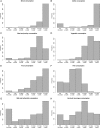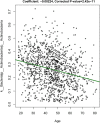Cohort profile: LifeLines DEEP, a prospective, general population cohort study in the northern Netherlands: study design and baseline characteristics
- PMID: 26319774
- PMCID: PMC4554905
- DOI: 10.1136/bmjopen-2014-006772
Cohort profile: LifeLines DEEP, a prospective, general population cohort study in the northern Netherlands: study design and baseline characteristics
Abstract
Purpose: There is a critical need for population-based prospective cohort studies because they follow individuals before the onset of disease, allowing for studies that can identify biomarkers and disease-modifying effects, and thereby contributing to systems epidemiology.
Participants: This paper describes the design and baseline characteristics of an intensively examined subpopulation of the LifeLines cohort in the Netherlands. In this unique subcohort, LifeLines DEEP, we included 1539 participants aged 18 years and older.
Findings to date: We collected additional blood (n = 1387), exhaled air (n = 1425) and faecal samples (n = 1248), and elicited responses to gastrointestinal health questionnaires (n = 1176) for analysis of the genome, epigenome, transcriptome, microbiome, metabolome and other biological levels. Here, we provide an overview of the different data layers in LifeLines DEEP and present baseline characteristics of the study population including food intake and quality of life. We also describe how the LifeLines DEEP cohort allows for the detailed investigation of genetic, genomic and metabolic variation for a wide range of phenotypic outcomes. Finally, we examine the determinants of gastrointestinal health, an area of particular interest to us that can be addressed by LifeLines DEEP.
Future plans: We have established a cohort of which multiple data levels allow for the integrative analysis of populations for translation of this information into biomarkers for disease, and which will offer new insights into disease mechanisms and prevention.
Keywords: EPIDEMIOLOGY; GENETICS; PUBLIC HEALTH.
Published by the BMJ Publishing Group Limited. For permission to use (where not already granted under a licence) please go to http://group.bmj.com/group/rights-licensing/permissions.
Figures




References
Publication types
MeSH terms
Substances
LinkOut - more resources
Full Text Sources
Other Literature Sources
